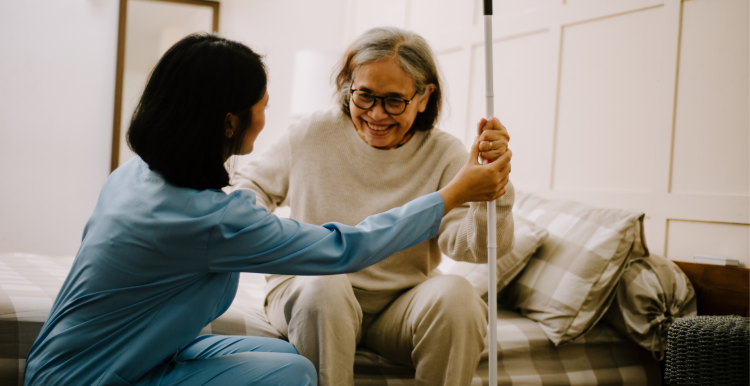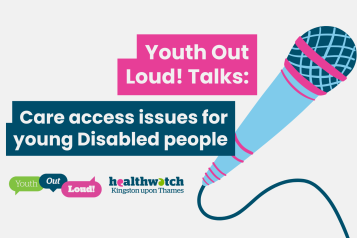What do we mean by NHS community care services
Community health services cover a wide range of services and provide care for people from birth to the end of their life. Community health teams play a vital role in supporting people with complex health and care needs to live independently in their own home for as long as possible.

NHS community care services include:
- Falls and bone health
- Community and district nursing
- 2-hour urgent community care
- Intermediate care – Rehabilitation, reablement and recovery
- Enhanced health in care homes
- Virtual wards
- Community palliative care
- Community podiatry
- Community physiotherapy
- Community occupational therapy
- Community speech and language therapy
- Specialist nurses - Diabetes, heart failure, continence, respiratory
- Proactive anticipatory care
Falls and bone health
- This service helps people at risk of falls and broken bones, maybe because they are elderly, have conditions such as osteoporosis or brittle bones or have had falls before.
- The service involves clinics run by specialist physiotherapists on home visits or where they will assess your environment for risks. They may give you a personalised exercise programme aimed at improving your balance, bone strength and flexibility. They also help boost people’s confidence after a fall, to help them stay mobile, which can be the key to avoiding further falls in future. As well as offering individual plans, they may refer you to a class in your local community.
- The service also works with people at risk of fractures because they have fragile bones because of osteoporosis. They may refer you to hospital for a bone density scan so you can be prescribed the right medication for bone strength.
Community and district nursing
- District nurses visit people who are housebound at home and sometimes in residential care homes to help with their physical health needs. They improve people’s quality of life and independence by helping them recover from illness or manage long-term conditions.
- It’s a wide-ranging role that involves taking blood samples for testing, checking your physical health by measuring your blood pressure and oxygen levels, changing wound dressings and giving routine vaccinations.
- Some district nurses prescribe medication and help you take your medicines, if you’re struggling – by administering eye drops or giving insulin injections if you have diabetes, for example.
- Community and district nurses work closely with other health and care professionals involved in your care such as GPs, physiotherapists or social workers to help you get the right treatment.
- They may visit you if you’ve just come out of hospital, to make sure you have the support you need to get better. They may assess you and contact other services to help your recovery – by organising equipment for your home or visits by therapists, for example.
- They also provide end-of-life care and support to patients and their families.
2-hour urgent community care
- If you’ve had a fall with no broken bones, you’re an older person suffering from a urinary tract infection that is making you unwell or need pain relief you may have seen the 2-hour urgent community response service.
- The service brings nurses, paramedics or other healthcare professionals to your door to help you stay well and comfortable at home, treating you for a wide range of health issues, helping avoid the need for you to go to hospital.
- Two-hour responders help by prescribing medication, ordering equipment to help prevent falls and referring people to voluntary organisations or social care. The aim is to make sure older people in crisis get speedy support, avoiding unnecessary visits to hospital.
Intermediate care - Rehabilitation, reablement and recovery
- If you’ve spent time in hospital after illness or a fall, intermediate care helps you regain your independence when you return home. It is short-term support to help you get back as much as possible to doing the things you could do before you went into hospital. It involves different types of support in your own home or a care home, if that is where you normally live. You will be assessed when you leave hospital to help you set goals around the things you would like to be able to do, to help your recovery. Your family or people who care for you will be involved with your care plan.
- For example, if you’ve broken a bone, you may receive visits from a physiotherapist to help you become more mobile or an occupational therapist who can organise the equipment at home to help you manage everyday activities. Social care workers may also be involved, to help you get used to preparing meals or washing and dressing too.
Enhanced health in care homes
- The enhanced care team visits people in both nursing and residential care homes to make sure they are getting the right care. They will assess your needs, make sure you have a plan for your care and refer you to a GP or other service if that is needed.
- They might see you in the home if you have a particular need – a wound that needs dressing, a catheter issue or you need medication to manage pain.
- They check in on residents after they have been in hospital and they also provide end-of- life care. In addition, they provide training for care home staff to help them respond to the needs of their residents, with help avoiding falls, for example.
Virtual wards
- Virtual wards are a way of caring for people who would otherwise be in hospital, from the comfort of their own home. They use a mix of technology and face-to-face visits to carry out all the checks and monitoring that would normally happen on a hospital ward – including your temperature, oxygen levels, breathing and heart rate.
- People are monitored 24 hours a day by doctors and nurses and have devices that mean they can call for assistance at any time.
- Virtual wards mean some people can avoid going to hospital in the first place or be able to go home earlier than they would otherwise.
- Sometimes referred to as a hospital at home service, virtual wards have lots of benefits for patients, including the chance to recover in the peace and quiet of their home environment.
Community palliative care
- Community palliative care nurses work with people who have progressive, life-limiting conditions and their families. Working in partnership with your GP practice and hospital specialists, they visit people at home to help them manage pain and the emotional impact of their condition. They help people plan for the future, to ensure their wishes for the end of their life are respected and they provide support to family members and carers. They also provide information about things like treatment options, financial support and other organisations that can help.
Community podiatry
- This service treats issues with your feet and ankles, which are having an impact on your general health. Community podiatrists see people in clinics or visit them at home or in care homes. You may need to see a podiatrist if you have certain medical conditions that can affect your feet including diabetes, arthritis and vascular disease.
- Services provided by community podiatry include wound and ulcer care, nail surgery, treatment for corns and callouses where people can’t manage themselves and supply orthotics (insoles for your shoes to help with foot problems). They can also help prevent falls in older people – with advice on footwear, for example.
Community physiotherapy
- Community physiotherapists visit you at home to help with rehabilitation after you have had an illness or injury.
- They may offer you an exercise programme to strengthen your muscles, increase your confidence and help you move more easily, as well as offering you advice about equipment to make daily life easier.
- They may also have strategies to help you cope with pain in your muscles or joints.
Community occupational therapy
- Occupational therapists help people live safely and independently at home.
- You may receive support from the occupational therapy service if you have a disability or a progressive medical condition.
- You may also receive short-term support after a spell in hospital or if you are recovering after illness.
- Therapists will visit you at home to find solutions that will help you manage everyday tasks. They may organise adaptations to your home or equipment or technology to make life easier or help you find new ways to carry out daily tasks in a way that works for you.
Community speech and language therapy
- Speech and language therapists work with adults and children who have language, communication and swallowing difficulties to improve their safety, quality of life and independence.
- In adults they often help people who find it difficult to swallow or speak because of neurological conditions such as Parkinson’s or a stroke. They also work with people who have had certain cancers or who have dementia.
- In children, they treat difficulties with speech and swallowing because of medical conditions and disabilities. They also work with children who aren’t meeting expected speech and language milestones.
- Therapists may offer appointments in clinics or visit you at home to carry out assessments, develop treatment plans or refer you to other services.
Specialist nurses - Diabetes, heart failure, continence, respiratory
- If you have certain conditions including diabetes, heart failure or respiratory disease, you may get support from a nurse who is a specialist in this area. There are also specialist nurses to support people with continence problems.
Proactive anticipatory care
- This service is aimed at people who are frail and elderly or have several long-term conditions. It is about providing the right care to people early, so they can avoid trips to A&E and being admitted to hospital. It is also about improving people’s quality of life and helping them live independently at home.
- If you are suitable for the service, you may receive visits from a care coordinator – someone who talks to you about your needs and goals and puts you in touch with services in your community – befriending or local groups for you to join if you’re feeling isolated, for example. A team, which may be made up of GPs, nurses, social workers and hospital specialists, will also work together to get you the right care, when you need it.


